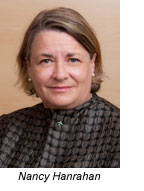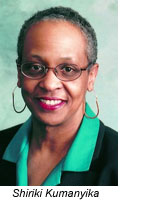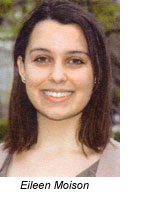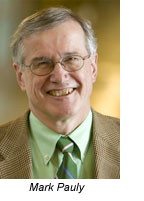|
|
 National Academy of Engineering: Dr. Discher National Academy of Engineering: Dr. Discher
Dr. Dennis E. Discher, the Robert D. Bent Professor of Chemical and Biomolecular Engineering in SEAS, has been elected to the National Academy of Engineering for his accomplishments in “elucidation of the effects of mechanical forces on cell physiology and stem cell development.”
Election to the National Academy of Engineering is among the highest professional distinctions accorded to an engineer. Academy membership honors those who have made outstanding contributions to “engineering research, practice, or education, including, where appropriate, significant contributions to the engineering literature,” and to the “pioneering of new and developing fields of technology, making major advancements in traditional fields of engineering, or developing/implementing innovative approaches to engineering education.” |
Reappointment as Chair of Presidential Commission
for the Study of Bioethical Issues: Dr. Gutmann
 Dr. Amy Gutmann, president of the University of Pennsylvania, has been reappointed chair of the Presidential Commission for the Study of Bioethical Issues by President Barack Obama. She has served in the position since first being appointed by President Obama in 2009 (Almanac December 8, 2009). Dr. Amy Gutmann, president of the University of Pennsylvania, has been reappointed chair of the Presidential Commission for the Study of Bioethical Issues by President Barack Obama. She has served in the position since first being appointed by President Obama in 2009 (Almanac December 8, 2009).
Also reappointed was the Commission’s vice chair, Dr. James W. Wagner, president of Emory University.
“I am grateful that these impressive individuals have chosen to dedicate their talents to serving the American people at this important time for our country,” President Obama said. “I look forward to working with them in the months and years ahead.”
|
Behavioral Health Committee: Dr. Hanrahan
 Dr. Nancy Hanrahan, the Dr. Lenore H. Kurlowicz Term Associate Professor of Nursing in the School of Nursing, has been appointed to the behavioral health steering committee of the National Quality Forum, a non-profit dedicated to improving American healthcare. Dr. Hanrahan’s program of research spans mental health policy and evaluation of the quality of mental health delivery systems, the integration of mental health in primary care services, and the assessment of neuro-cognitive impairment and cognitive symptom management across all chronic illnesses. Her work, funded by the Robert Wood Johnson Foundation, focuses on inpatient psychiatric outcomes and testing transitional care models for post-hospital care of patients discharged from a hospitalization for a psychiatric condition. Dr. Nancy Hanrahan, the Dr. Lenore H. Kurlowicz Term Associate Professor of Nursing in the School of Nursing, has been appointed to the behavioral health steering committee of the National Quality Forum, a non-profit dedicated to improving American healthcare. Dr. Hanrahan’s program of research spans mental health policy and evaluation of the quality of mental health delivery systems, the integration of mental health in primary care services, and the assessment of neuro-cognitive impairment and cognitive symptom management across all chronic illnesses. Her work, funded by the Robert Wood Johnson Foundation, focuses on inpatient psychiatric outcomes and testing transitional care models for post-hospital care of patients discharged from a hospitalization for a psychiatric condition.
The Nursing Quality Forum committee is working to establish national priorities to improve the delivery of behavioral health services, achieve better behavioral health outcomes, and improve the behavioral health of the US population, especially in the areas of mental illness and substance abuse. To learn more, visit www.qualityforum.com |
Public Health Award: Dr. Kumanyika
 Dr. Shiriki Kumanyika, professor of epidemiology in the department of biostatistics and epidemiology and in the nutrition section of the department of pediatrics within the Perelman School of Medicine, was given the Wade Hampton Frost Lecture Award from the Epidemiology Section of the American Public Health Association at the 2011 APHA Annual meeting in Washington, DC. Dr. Shiriki Kumanyika, professor of epidemiology in the department of biostatistics and epidemiology and in the nutrition section of the department of pediatrics within the Perelman School of Medicine, was given the Wade Hampton Frost Lecture Award from the Epidemiology Section of the American Public Health Association at the 2011 APHA Annual meeting in Washington, DC.
This award recognizes a person who has made a significant contribution to addressing a public health issue of major importance by applying epidemiologic methods. Dr. Kumanyika has a unique interdisciplinary background that integrates epidemiology, nutrition, minority health and women’s health issues with a focus on prevention. Her research focuses on nutritional factors in the primary and secondary prevention of chronic diseases, with a particular focus on obesity.
Dr. Kumanyika is also senior advisor to the Center for Public Health Initiatives and associate dean for Health Promotion and Disease Prevention. |
Hodgkin Award: Dr. Lemmon
 Dr. Mark Lemmon, professor and chair of biochemistry and biophysics in the Perelman School of Medicine, is the recipient of the 2012 Dorothy Crowfoot Hodgkin Award from The Protein Society, which will be conferred at the 26th Annual Symposium of The Protein Society in August. Dr. Mark Lemmon, professor and chair of biochemistry and biophysics in the Perelman School of Medicine, is the recipient of the 2012 Dorothy Crowfoot Hodgkin Award from The Protein Society, which will be conferred at the 26th Annual Symposium of The Protein Society in August.
The Dorothy Crowfoot Hodgkin Award is granted in recognition of exceptional contributions in protein science, which profoundly influence our understanding of biology. |
Refunds for Research: Dr. Minn
 At the PA Breast Cancer Coalition’s kick off for its annual Refunds for Breast and Cervical Cancer Research event earlier this month, Dr. Andy Minn, assistant professor of radiation oncology in the Perelman School of Medicine, was recognized as a 2012 Refunds for Research awardee. He was honored with a $50,000 grant for his research. The PBCC’s Refunds for Research campaign encourages Pennsylvania taxpayers to donate all or part of their state income tax refund to support breast cancer research happening right here in the state. Every penny donated through the program goes to fund grants to researchers. At the PA Breast Cancer Coalition’s kick off for its annual Refunds for Breast and Cervical Cancer Research event earlier this month, Dr. Andy Minn, assistant professor of radiation oncology in the Perelman School of Medicine, was recognized as a 2012 Refunds for Research awardee. He was honored with a $50,000 grant for his research. The PBCC’s Refunds for Research campaign encourages Pennsylvania taxpayers to donate all or part of their state income tax refund to support breast cancer research happening right here in the state. Every penny donated through the program goes to fund grants to researchers. |
Gates Cambridge Scholar: Ms. Moison
 Senior Eileen Moison has been awarded a Gates Cambridge Scholarship to pursue a MPhil in biochemistry at Cambridge University in the United Kingdom. She is currently studying biochemistry and business in the Vagelos Program in Life Sciences and Management at the University of Pennsylvania. Senior Eileen Moison has been awarded a Gates Cambridge Scholarship to pursue a MPhil in biochemistry at Cambridge University in the United Kingdom. She is currently studying biochemistry and business in the Vagelos Program in Life Sciences and Management at the University of Pennsylvania. |
Graham Prize for Health Services Research: Dr. Pauly
 Dr. Mark Pauly, Bendheim Professor, professor of health care management, and professor of business and public policy in the Wharton School, is the 2012 winner of the William B. Graham Prize for Health Services Research, funded by the Baxter International Foundation and administered by the Association of University Programs in Health Administration. The Baxter International Foundation established this Prize to recognize its longtime CEO, William Graham. The prize award includes $50,000. Dr. Pauly will be honored in May. Dr. Mark Pauly, Bendheim Professor, professor of health care management, and professor of business and public policy in the Wharton School, is the 2012 winner of the William B. Graham Prize for Health Services Research, funded by the Baxter International Foundation and administered by the Association of University Programs in Health Administration. The Baxter International Foundation established this Prize to recognize its longtime CEO, William Graham. The prize award includes $50,000. Dr. Pauly will be honored in May. |
AIA Fellow: Professor Weiss
 Marion Weiss, professor of architecture in the School of Design, has been selected as a 2012 Fellow by the American Institute of Architecture (AIA). The Fellowship honors architects who have made a significant contribution to architecture and society and who have achieved a standard of excellence in the profession. Marion Weiss, professor of architecture in the School of Design, has been selected as a 2012 Fellow by the American Institute of Architecture (AIA). The Fellowship honors architects who have made a significant contribution to architecture and society and who have achieved a standard of excellence in the profession.
Professor Weiss, the co-founder of the firm Weiss/Manfredi in New York, is among 105 AIA members selected to the College of Fellows this year. They will be honored at the AIA’s national convention in Washington, DC, in May. |
The 2012 George H. Heilmeier Faculty Award for Excellence in Research—Lecture: March 13
 Dr. Karen I. Winey, professor of materials science and engineering in SEAS, has been named the 2012 recipient of the George H. Heilmeier Faculty Award for Excellence in Research. She is also Penn’s director for the Nanotechnology Institute and the Energy Commercialization Institute (Almanac February 21, 2012). Dr. Karen I. Winey, professor of materials science and engineering in SEAS, has been named the 2012 recipient of the George H. Heilmeier Faculty Award for Excellence in Research. She is also Penn’s director for the Nanotechnology Institute and the Energy Commercialization Institute (Almanac February 21, 2012).
The Heilmeier Award will be presented following Dr. Winey’s lecture on Electrical Properties in Polymer Nanocomposites on March 13, at 4:30 p.m. in the Wu and Chen Auditorium in Levine Hall.
Dr. Winey’s research interests include both polymer nanocomposites and ion-containing polymers. In nanocomposites, she designs and fabricates polymer nanocomposites containing carbon nanotubes and metal nanowires with the aim of understanding how to improve their mechanical, thermal, and in particular, electrical conductivity and resistive switching properties. In ion-containing polymers, including block copolymers and polymers with ionic liquids, Dr. Winey combines imaging and scattering methods to provide unprecedented insights into their morphologies.
The George H. Heilmeier Faculty Award for Excellence in Research was established by Penn Engineering for the purpose of recognizing excellence in scholarly activities of the faculty. Named in honor of George H. Heilmeier, it recognizes his extraordinary research career, his leadership in technical innovation and public service, and his loyal and steadfast support of Penn Engineering. |
ACS Award: Dr. Yang
 Dr. Shu Yang, associate professor in materials science and engineering in SEAS, has been chosen, along with her research group, to receive the Arthur K. Doolittle Award from the American Chemical Society (ACS), Division of Polymeric Materials Science and Engineering (PMSE) for their paper, Understanding pattern transformation mechanisms in different responsive hydrogel membranes. This award is given to the best paper presented before the PMSE Division at each national meeting of the ACS and will be formally presented next month at the 243rd ACS National Meeting in San Diego, CA. Dr. Shu Yang, associate professor in materials science and engineering in SEAS, has been chosen, along with her research group, to receive the Arthur K. Doolittle Award from the American Chemical Society (ACS), Division of Polymeric Materials Science and Engineering (PMSE) for their paper, Understanding pattern transformation mechanisms in different responsive hydrogel membranes. This award is given to the best paper presented before the PMSE Division at each national meeting of the ACS and will be formally presented next month at the 243rd ACS National Meeting in San Diego, CA.
Dr. Yang and her group work to develop new methodologies for the controlled synthesis, fabrication and characterization of materials with specific and unique structures and functionalities inspired by biology. Special interests include preparation of functional (co)polymers and investigation of their self-assembled nanostructures; understanding the self-organization process at surfaces and interfaces; development of novel responsive materials and non-conventional approaches for nano- and micropatterning of complex 2-D and 3-D structures; and controlling wetting, adhesion and biofouling on polymer thin films. |
Sloan Fellowships
Four University of Pennsylvania faculty members are among this year’s Sloan Fellowship recipients. Since 1955, the Alfred P. Sloan Foundation has granted yearly fellowships to early-career scientists and scholars whose achievements and potential identify them as the next generation of scientific leaders.
To qualify, candidates must be nominated by their peers and selected by an independent panel of senior scholars. Each Fellow receives a two-year, $50,000 award to further his or her research.
Penn’s 2012 Sloan Fellows are:
Dr. Christopher Fang-Yen, assistant professor of bioengineering, School of Engineering and Applied Science, and assistant professor of neuroscience, Perelman School of Medicine—Dr. Fang-Yen’s laboratory uses optical and genetic tools to study the neurobiology of a millimeter-long worm known as C. elegans. With only a few hundred neurons and a transparent body, this worm is an ideal model for researching how neural circuitry generates behavior.
Dr. E. James Petersson, assistant professor of chemistry, School of Arts and Sciences—Dr. Petersson takes a multidisciplinary approach to studying how proteins change shape; misfolding into the incorrect shape can cause proteins to clump, causing neurodegenerative diseases, such as Alzheimer’s and Parkinson’s diseases. The Petersson laboratory develops novel probes to study protein shape in vitro and in living cells in order to understand these folding motions in molecular detail.
Dr. Joseph Subotnik, assistant professor physical and theoretical chemistry, School of Arts and Sciences—Dr. Subotnik examines chemistry both at the level of individual electrons and large molecules, seeking to understand how energy is transferred in a chemical reaction, how long that energy lasts before it is lost to friction and how scientists can best control and manipulate that energy for future energy production.
Dr. Benjamin F. Voight, assistant professor of pharmacology, Perelman School of Medicine—As a geneticist and computational biologist, Dr. Voight’s research involves constructing and applying statistical methods to genomics data collected across thousands of human genomes, with the aim of uncovering how genetic variation contributes to the diverse set of traits evolved during recent human history and to the range of diseases present today. His work has identified risk-related alleles for type-2 diabetes and heart attack, among other conditions, and hundreds of regions of the human genome experiencing recent positive selection. |
|
Almanac -
,
|
|
|